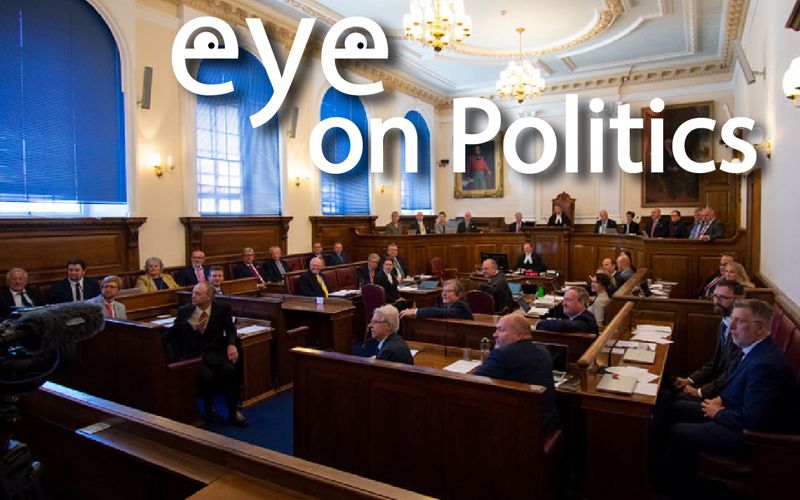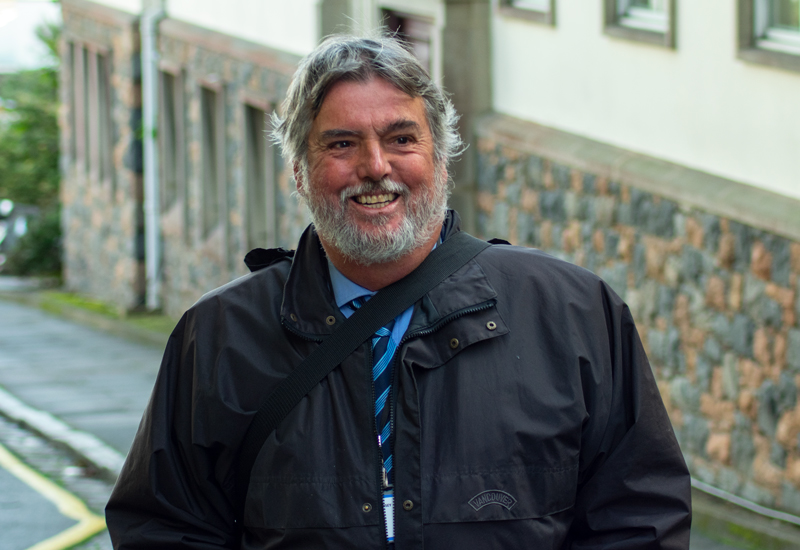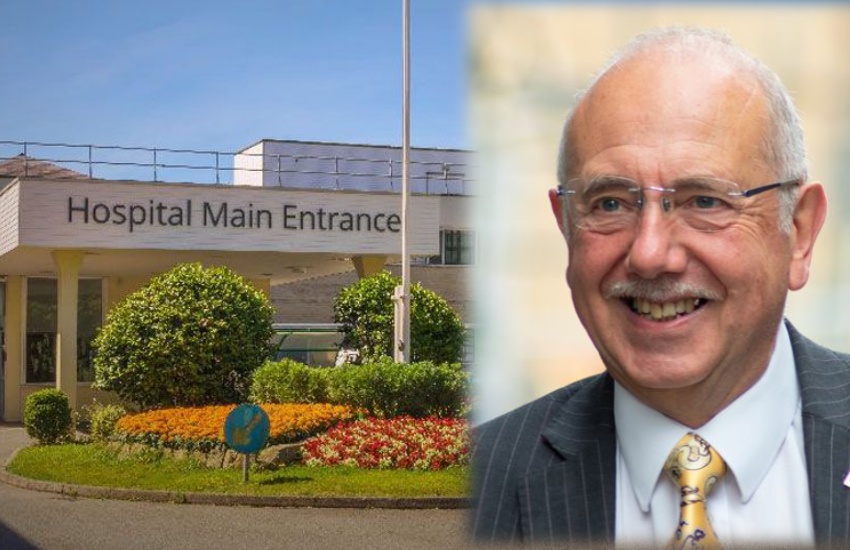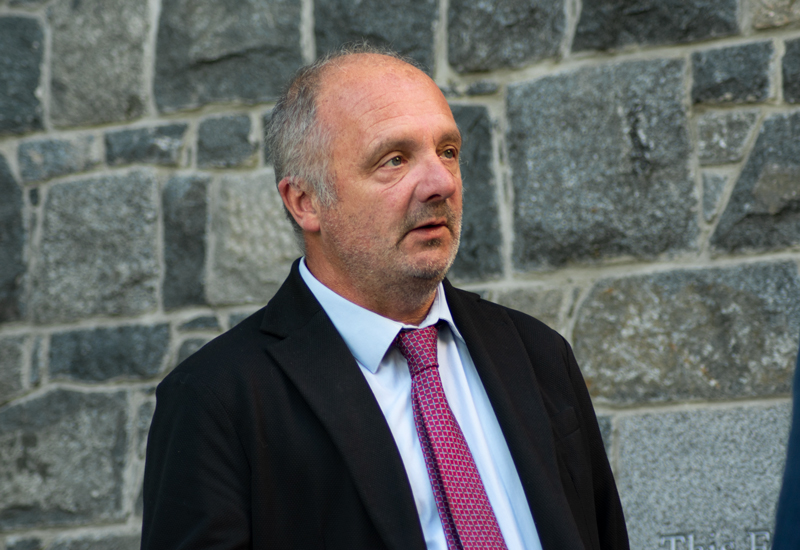


Welcome to the second edition of EYE ON POLITICS from Express. We’ll be digging deeper behind the headlines to help you make sense of the goings-on in Guernsey politics. Including taking a closer look at the agenda before meetings of the States’ Assembly.
Here’s your EYE ON POLITICS digest for the States’ meeting which starts tomorrow…
Last time, we considered why some committee presidents relish the requirement to make statements about their committee's work and others do it because they must. Tomorrow's States' meeting features one example of each: Deputy Peter Roffey on behalf of his Committee for Employment & Social Security and Deputy Al Brouard on behalf of his Committee for Health & Social Care.
Deputy Roffey gives the impression of approaching these sessions effortlessly. Don't expect any questions which really catch him out: on his feet in the Assembly, he may be the best there has ever been, and he puts in the hard yards to be fully across his brief.
For his statement, he will get 10 minutes uninterrupted at a set time on the agenda without having to employ his less endearing habit of leaping to his feet so rapidly whenever a debate is opened that he is invariably called to speak first.
States' members with their fingers on the pulse try to make questions following statements relevant to the topical issues facing islanders and the States. So Deputy Roffey really should face questions on what his Committee is planning to do to alleviate increasing cost of living pressures, especially on the least well off, including pensioners.

Pictured: Deputy Peter Roffey will provide the first statement at tomorrow's States' meeting and will then face questions without notice on the work of the Committee for Employment & Social Security.
Deputy Brouard may not look forward to his 10 minutes as much as Deputy Roffey, but he does have a disarmingly calm and effective style which is usually enough to see off critics. Most of his colleagues also still remember that they owe him one for being the only member with the courage, albeit reluctantly, to take on what was seen as a poisoned chalice presidency at Health & Social Care.
Sometimes presidents find that it is their turn to make a statement and face questions at the most inopportune of times. Such is Deputy Brouard's lot this week.
He has a divided committee on two significant live issues: where to build key worker accommodation at the Princess Elizabeth Hospital and whether to review the legal status of cannabis.
Health & Social Care is also battling widespread problems with electronic patient records and more specific but very serious difficulties with certain services, such as gastroenterology.

Pictured: Deputy Al Brouard will also update the States' Assembly on the work of his Committee, Health & Social Care, and face questions without notice.
Five sets of questions have been submitted to four committees by three members.
Deputy David De Lisle wants the President of the Committee for the Environment & Infrastructure, Deputy Lindsay de Sausmarez, to account for problems with the island's bus service provided - or, sadly, in several cases lately not provided - by CT Plus.
His questions include phrases such as "why has the problem not been resolved..." and "whether [Deputy de Sausmarez] has taken steps to reduce the payment CT Plus receives...", which indicate that they are not meant to be friendly questions to say the least.
After putting another round of transport-related questions to Deputy de Sausmarez, Deputy John Gollop will then provide an example of questions which are meant to be friendly when he asks the President of the Committee for Education, Sport & Culture, Deputy Andrea Dudley-Owen, whether she will "seek feedback on the success of the island-wide decentralised parochial" Liberation Day events and whether she has any other thoughts on the celebrations for future years.
One is sure the questions were not written by the Committee, but they might have looked scarcely any different if they had been.

Pictured: Deputy Neil Inder will answer questions from Deputy Gavin St Pier about the Committee for Economic Development's reluctance to provide financial support to the producers of the film Toilers of the Sea.
Then Deputy Gavin St Pier will put questions to the President of the Committee for Economic Development, Deputy Neil Inder, about his Committee's view that no public funding should be provided to support production in the island of the film Toilers of the Sea.
Finally, Deputy St Pier has a question in on the development of a wider scheme for the Bailiwick to offer refuge to Ukrainians fleeing war. The Committee for Home Affairs may have drawn the sting out of the question by publishing an update in a media release today. If a minister tried that at Westminster, he or she might expect to face the wrath of the Speaker, but in Guernsey anyone trying to marshal arguments on such constitutional points is likely to be dismissed as a process junkie.
The Committee for Employment & Social Security hopes to have its secondary pensions scheme up and running next year.
Figures presented to the States previously suggested that, in the first year of the scheme, employees and employers would both pay 1% of the employees' salary into his or her new pension pot. Contribution rates would then increase over the following seven years. If the scheme starts in 2023, contribution rates by the year 2030 would be 6.5% for the employee and 3.5% for the employer.
This means that, in the long term, an employee with a salary of £50,000 would pay £3,250 per year into his or her secondary pension pot and the employer would pay £1,750 per year - a total of £5,000 annually.

Pictured: It is estimated that at present approximately 60% of the island's working-age population - around 25,000 people - are not contributing to a private pension.
The principles and some of the details of the scheme have already been approved by the States' Assembly. Indeed, Deputy Roffey's is the third or possibly fourth successive Committee for Employment & Social Security to have had a hand in the development of the long-awaited scheme.
Nevertheless, not very long ago, political supporters of the scheme were worried that the present Assembly could shelve it at a time of heightened economic uncertainty and increases in the cost of living. They wondered if this week's debate might be the time for sceptics of the scheme to start trying to undo it. But they now think that support for the scheme from the States' senior committee, Policy & Resources, will be enough to help clear remaining hurdles and secure the final approval of the States.

Pictured: This week's States' meeting features a rare debate in the Assembly on justice policy.
It has the flavour of one of those reports so beloved of States' committees over the past 20-25 years which is sufficiently abstract - strategy they call it - to mean anything and everything one wants to read into it and therefore highly unlikely to excite interest, let alone sustained challenge or opposition.
On the other hand, it could represent the start of quite a momentous shift in public policy.
Traditionally, the idea that an elected parliament or its committees might want to shape or change justice policy - in the same way they do, say, health policy or transport policy - has been quite trenchantly resisted in Guernsey, unlike in most other places in the democratic world.
The very fact the States' Assembly is debating and will almost certainly approve an extensive Justice Framework, which is then likely to set off a range of other work on justice policy, may be another small but significant step on the long and historic road of policy and parliament extending the sphere of democracy in Guernsey.
The full Order Paper for this week's meeting is available by clicking HERE.
Comments
Comments on this story express the views of the commentator only, not Bailiwick Publishing. We are unable to guarantee the accuracy of any of those comments.